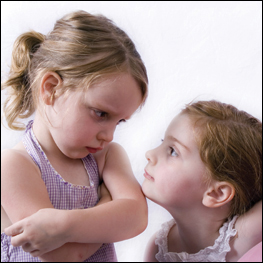Nobody likes a tattletale - not even their mother or father. If your child’s playdates and sleepovers are punctuated by whiney reports of misdeeds and injustice, you may be tempted to clear your kid’s social calendar. Not so fast. Interactions with siblings and friends allow kids to practice communication, negotiation and compromise. And dissatisfaction is part of the process.
 “In early childhood, it’s normal for kids to share social problems with parents,” says psychologist and school consultant Michael Thompson, Ph.D., author of Best Friends, Worst Enemies: Understanding the Social Lives of Children. At times, they legitimately need our help resolving disputes and soothing hurt feelings. But by second grade, the prohibition against inviting adults into social conflicts is clear. “Kids who tattle get labelled - tattletale, squealer, snitch - and left out,” says Thompson. Bringing infractions to an adult’s attention sets your kid up for friendship failure.
“In early childhood, it’s normal for kids to share social problems with parents,” says psychologist and school consultant Michael Thompson, Ph.D., author of Best Friends, Worst Enemies: Understanding the Social Lives of Children. At times, they legitimately need our help resolving disputes and soothing hurt feelings. But by second grade, the prohibition against inviting adults into social conflicts is clear. “Kids who tattle get labelled - tattletale, squealer, snitch - and left out,” says Thompson. Bringing infractions to an adult’s attention sets your kid up for friendship failure.
Why kids tattle
Parents might assume kids tattle because they don’t feel empowered to stick up for themselves, says Fran Walfish, Ph.D., a child and adolescent psychotherapist. That’s not true. “Kids tattle because they’ve developed a strong sense of right and wrong and they start policing other people,” says Walfish. Tattletales suffer from an overdose of conscience.
“Tattling at home may also be rooted in sibling rivalry,” says Walfish. An older child might feel they are held to a higher standard than their younger siblings, or that they are disciplined more severely. And they may be right. “Parents need to take an honest look within,” says Walfish. “If you are harsh and judgmental with your children, they’ll act the same way with peers.”
How to respond
It seems obvious: giving attention to a child who tattles will only reward them for tattling. But experts say parents shouldn’t dismiss kids’ reports or tell them to “get over it.” Sometimes kids who tattle just want a safe place to share their concerns.
“Kids won’t say, ‘I need you to listen to this and be outraged on my behalf and then do absolutely nothing,’” says Thompson, “but 90 per cent of the time that is what they want.” When your child comes to you with a story, listen, accept, acknowledge and bear it. Ask questions about how your child plans to handle the situation - that will bring out their inner resilience.
Tattletales who judge and blame are usually more focused on their peers’ behavior than their own. “Position yourself as a mediator,” says Walfish. Kids should present their concerns to each other, not to authority figures. Give each child a chance to speak their piece without interruption or name-calling. You want them to learn how to wrestle with a conflict face-to-face without demeaning the other person.
“This won’t come easy,” Walfish cautions. It is common for parents to get drawn into the dialogue. Step back emotionally so you can coach your child through it without taking sides.
After each child has a chance to talk, ask, “How could you work this out?” Listen to kids’ ideas for addressing the problem. If they don’t have any, offer some suggestions. Let kids choose how to proceed. “The resolution is not nearly as important as the process of working it out,” says Walfish.
Except in extreme circumstances - like when one child is intentionally hurt or belittled - don’t take sides or punish the other child for what a tattletale reported. “Play the role of supportive consultant, not hired gun,” says Thompson. You’ll reinforce the tattler if you act on the information they offered.
Chronic tattling can leave parents feeling frazzled. It may help to arm yourself with kind, matter-of-fact phrases you can use in response, says Walfish. Say, “There are only two grown-ups in this house, and it’s our responsibility to enforce the rules.” Assuring ‘kid cops’ that you are on the job may reduce their need to patrol and shift their attention back to their own activities.
Practice compassion
Not all sharing is tattling, and there will certainly be times when you must intervene to protect your child. Be cautious in your assessment of the situation. “Parents are too quick to define peer behavior as bullying and to accuse other kids, parents or teachers of wrongdoing,” Thompson says. Rushing to judgment reinforces a child’s sense that they are a victim in need of rescue.
It’s usually best to diffuse hurt feelings with empathy instead of going on the offensive. Set the expectation that tomorrow will be a better day. Spend one-on-one time with your child doing something they enjoy. Loving attention can quiet even the noisiest tattletale.
Heidi Smith Luedtke, Ph.D., is a personality psychologist and mom of two. She shares psychology lessons for real life at www.heidiluedtke.com/blog.
Calgary’s Child Magazine © 2024 Calgary’s Child